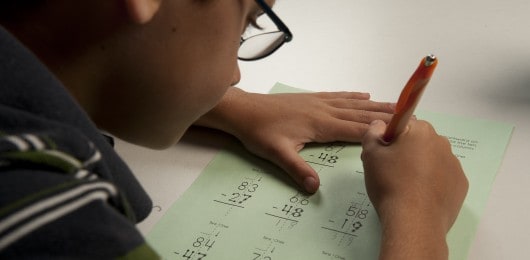
Homework is part of the fabric of after school life for most families with school-age children. For some, it is the cause of immense frustration and even tears (from children and/or parents!). It comes as no surprise that a quick Amazon search on the subject of homework reveals such titles as Homework Without Tears, Ending the Homework Hassle, Homework Made Simple, and my favorite—How to Do Homework Without Throwing Up.
Research about the value of homework is inconclusive. Some researchers find that homework increases stress and limits student’s extracurricular opportunities while it does not have a measurable impact on achievement.(1) (2) In contrast, there is research that notes a positive correlation between amount of homework and achievement outcomes, particularly in grades seven through twelve.(3)
Despite the lack of consensus, especially when it comes to the value of homework for children in the elementary grades, most schools maintain the status quo, assigning homework beginning as early as kindergarten. For many administrators and parents alike, homework is a sign of how rigorous the education is, how seriously the school takes learning. In fact, teachers who don’t give much homework may be seen as lackadaisical. And so most teachers continue to assign homework—even those teachers who question its value, have little time to give feedback on it (beyond a check, check plus, check minus), and recognize the stress it places on families.
On the other hand, some schools are rewriting their homework policy. The school in Manhattan featured in this article is changing its approach to homework by offering students a menu of options from which to choose. The options, such as finding the area of a household object or playing chess with a family member or friend, focus on applying book learning and interacting with others. This new homework policy must be meant, at least in part, to move students away from the screen and into the world.
It also seems to be part of a growing movement of parents, educators, and policy makers who question the increasing focus on testing (which is also administered via computer screen in many Massachusetts districts), the earlier introduction of academic skills in kindergarten and first grade, and the elimination of unstructured time in the classroom and recess. This movement tends to cite the research of Dr. David Elkind, psychologist and child development expert, who emphasizes the importance of play and unstructured time for healthy social, emotional, and cognitive development.
The field of education desperately needs a thoughtful and deliberate approach to all policies. It seems that we do many things in schools because that’s the way they have always been done. In some ways, our approach to education has not changed much in the last fifty years, but the world around us has gone through some remarkable changes. As educators, we need to think about how these changes affect our students and how we can best prepare our students for their lives beyond our walls. The National Parent-Teacher Association recommends 10-20 minutes of homework per day for first graders and an additional 10 minutes per grade level thereafter, but does not specify best practices for the nature of homework.
What it comes down to is that, whether by asking them to complete a worksheet on currency percentages or instructing them to take charge of calculating the tip each time their family goes out to dinner, we need to provide our students with homework that puts learning into context. This supports one of our primary goals as educators: to help students bring classroom skills into real-world practice.
(1) Kohn, Alfie (2006). The Truth About Homework. Education Week
(2) Kralovec, E., & Buell, J. (2000). The end of homework: How homework disrupts families, overburdens children, and limits learning. Boston: Beacon Press.
(3) Cooper, H., Robinson, J. C., & Patall, E. A. (2006). Does homework improve academic achievement? A synthesis of research, 1987–2003. Review of Educational Research, 76(1), 1–62.










Jaydin Skinner says: